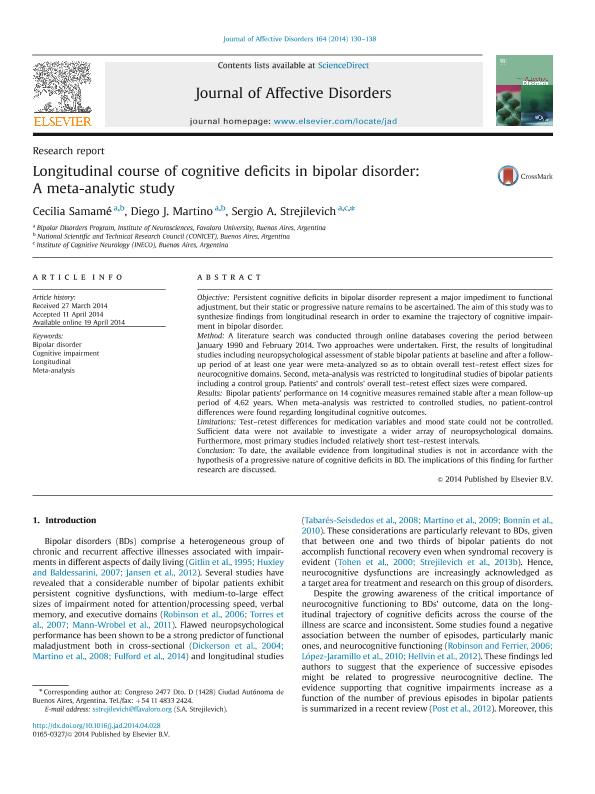Mostrar el registro sencillo del ítem
dc.contributor.author
Samame, Cecilia

dc.contributor.author
Martino, Diego Javier

dc.contributor.author
Strejilevich, Sergio

dc.date.available
2018-01-09T20:42:38Z
dc.date.issued
2014-04
dc.identifier.citation
Strejilevich, Sergio; Martino, Diego Javier; Samame, Cecilia; Longitudinal course of cognitive deficits in bipolar disorder: a meta-analytic study; Elsevier; Journal of Affective Disorders; 164; 4-2014; 130-138
dc.identifier.issn
0165-0327
dc.identifier.uri
http://hdl.handle.net/11336/32754
dc.description.abstract
OBJECTIVE: Persistent cognitive deficits in bipolar disorder represent a major impediment to functional adjustment, but their static or progressive nature remains to be ascertained. The aim of this study was to synthesize findings from longitudinal research in order to examine the trajectory of cognitive impairment in bipolar disorder.
METHOD: A literature search was conducted through online databases covering the period between January 1990 and February 2014. Two approaches were undertaken. First, the results of longitudinal studies including neuropsychological assessment of stable bipolar patients at baseline and after a follow-up period of at least one year were meta-analyzed so as to obtain overall test-retest effect sizes for neurocognitive domains. Second, meta-analysis was restricted to longitudinal studies of bipolar patients including a control group. Patients' and controls' overall test-retest effect sizes were compared.
RESULTS: Bipolar patients' performance on 14 cognitive measures remained stable after a mean follow-up period of 4.62 years. When meta-analysis was restricted to controlled studies, no patient-control differences were found regarding longitudinal cognitive outcomes.
LIMITATIONS: Test-retest differences for medication variables and mood state could not be controlled. Sufficient data were not available to investigate a wider array of neuropsychological domains. Furthermore, most primary studies included relatively short test-restest intervals.
CONCLUSION: To date, the available evidence from longitudinal studies is not in accordance with the hypothesis of a progressive nature of cognitive deficits in BD. The implications of this finding for further research are discussed.
dc.format
application/pdf
dc.language.iso
eng
dc.publisher
Elsevier

dc.rights
info:eu-repo/semantics/openAccess
dc.rights.uri
https://creativecommons.org/licenses/by-nc-sa/2.5/ar/
dc.subject
Bipolar Disorder
dc.subject
Cognitive Impairments
dc.subject
Longitudinal
dc.subject
Meta-Analysis
dc.subject.classification
Medicina Critica y de Emergencia

dc.subject.classification
Medicina Clínica

dc.subject.classification
CIENCIAS MÉDICAS Y DE LA SALUD

dc.title
Longitudinal course of cognitive deficits in bipolar disorder: a meta-analytic study
dc.type
info:eu-repo/semantics/article
dc.type
info:ar-repo/semantics/artículo
dc.type
info:eu-repo/semantics/publishedVersion
dc.date.updated
2018-01-08T19:46:23Z
dc.journal.volume
164
dc.journal.pagination
130-138
dc.journal.pais
Países Bajos

dc.journal.ciudad
Ámsterdam
dc.description.fil
Fil: Samame, Cecilia. Universidad Favaloro. Facultad de Medicina. Instituto de Neurociencias. Programa de Trastornos Bipolares; Argentina. Consejo Nacional de Investigaciones Científicas y Técnicas; Argentina
dc.description.fil
Fil: Martino, Diego Javier. Universidad Favaloro. Facultad de Medicina. Instituto de Neurociencias. Programa de Trastornos Bipolares; Argentina. Consejo Nacional de Investigaciones Científicas y Técnicas; Argentina
dc.description.fil
Fil: Strejilevich, Sergio. Universidad Favaloro. Facultad de Medicina. Instituto de Neurociencias. Programa de Trastornos Bipolares; Argentina. Instituto de Neurología Cognitiva; Argentina
dc.journal.title
Journal of Affective Disorders

dc.relation.alternativeid
info:eu-repo/semantics/altIdentifier/url/http://www.sciencedirect.com/science/article/pii/S0165032714002122
dc.relation.alternativeid
info:eu-repo/semantics/altIdentifier/doi/http://dx.doi.org/10.1016/j.jad.2014.04.028
Archivos asociados
